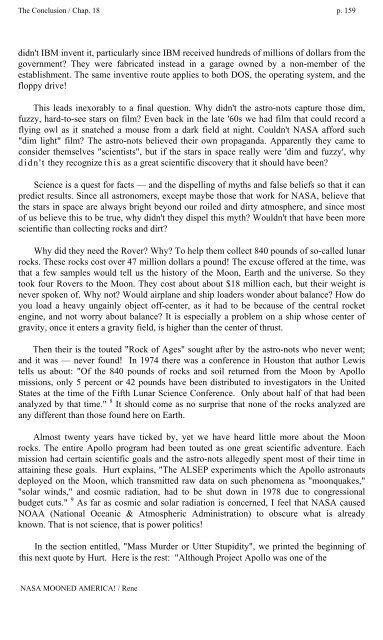Rene-NASA-Mooned-America
Rene-NASA-Mooned-America
Rene-NASA-Mooned-America
Create successful ePaper yourself
Turn your PDF publications into a flip-book with our unique Google optimized e-Paper software.
The Conclusion / Chap. 18 p. 159<br />
didn't IBM invent it, particularly since IBM received hundreds of millions of dollars from the<br />
government They were fabricated instead in a garage owned by a non-member of the<br />
establishment. The same inventive route applies to both DOS, the operating system, and the<br />
floppy drive!<br />
This leads inexorably to a final question. Why didn't the astro-nots capture those dim,<br />
fuzzy, hard-to-see stars on film Even back in the late '60s we had film that could record a<br />
flying owl as it snatched a mouse from a dark field at night. Couldn't <strong>NASA</strong> afford such<br />
"dim light" film The astro-nots believed their own propaganda. Apparently they came to<br />
consider themselves "scientists", but if the stars in space really were 'dim and fuzzy', why<br />
didn't they recognize this as a great scientific discovery that it should have been<br />
Science is a quest for facts — and the dispelling of myths and false beliefs so that it can<br />
predict results. Since all astronomers, except maybe those that work for <strong>NASA</strong>, believe that<br />
the stars in space are always bright beyond our roiled and dirty atmosphere, and since most<br />
of us believe this to be true, why didn't they dispel this myth Wouldn't that have been more<br />
scientific than collecting rocks and dirt<br />
Why did they need the Rover Why To help them collect 840 pounds of so-called lunar<br />
rocks. These rocks cost over 47 million dollars a pound! The excuse offered at the time, was<br />
that a few samples would tell us the history of the Moon, Earth and the universe. So they<br />
took four Rovers to the Moon. They cost about about $18 million each, but their weight is<br />
never spoken of. Why not Would airplane and ship loaders wonder about balance How do<br />
you load a heavy ungainly object off-center, as it had to be because of the central rocket<br />
engine, and not worry about balance It is especially a problem on a ship whose center of<br />
gravity, once it enters a gravity field, is higher than the center of thrust.<br />
Then their is the touted "Rock of Ages" sought after by the astro-nots who never went;<br />
and it was — never found! In 1974 there was a conference in Houston that author Lewis<br />
tells us about: "Of the 840 pounds of rocks and soil returned from the Moon by Apollo<br />
missions, only 5 percent or 42 pounds have been distributed to investigators in the United<br />
States at the time of the Fifth Lunar Science Conference. Only about half of that had been<br />
analyzed by that time." 8 It should come as no surprise that none of the rocks analyzed are<br />
any different than those found here on Earth.<br />
Almost twenty years have ticked by, yet we have heard little more about the Moon<br />
rocks. The entire Apollo program had been touted as one great scientific adventure. Each<br />
mission had certain scientific goals and the astro-nots allegedly spent most of their time in<br />
attaining these goals. Hurt explains, "The ALSEP experiments which the Apollo astronauts<br />
deployed on the Moon, which transmitted raw data on such phenomena as "moonquakes,"<br />
"solar winds," and cosmic radiation, had to be shut down in 1978 due to congressional<br />
budget cuts." 9 As far as cosmic and solar radiation is concerned, I feel that <strong>NASA</strong> caused<br />
NOAA (National Oceanic & Atmospheric Administration) to obscure what is already<br />
known. That is not science, that is power politics!<br />
In the section entitled, "Mass Murder or Utter Stupidity", we printed the beginning of<br />
this next quote by Hurt. Here is the rest: "Although Project Apollo was one of the<br />
<strong>NASA</strong> MOONED AMERICA! / <strong>Rene</strong>


